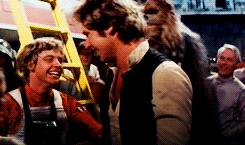Beholding the Face of the Father
Aug. 14th, 2018 01:23 pm~






I very much hope I’m wrong about this. So, on the slight chance that it might help somehow, I’ll try to explain why I feel this way right now.
( Read more... )
Recently, I was asked to write about ‘Anakin as a tragic hero’, and rather than attempting to tackle such a broad topic from scratch, I decided to compile a masterpost of excerpts from (and links to) my previous posts on the subject.
In my personal view, ‘Star Wars’ (as in, the Skywalker saga) is, at its heart, Anakin’s story, and as such, his tragic fall and ultimate redemption forms one of the main, underlying themes of most of my SW analysis in general. And so, the selections below include everything from in-depth character analysis, to overviews of Anakin’s role in the saga as a whole, to explorations of themes of slavery vs. freedom, death vs. immortality, personal attachments, fear of loss, and perhaps most importantly, unconditional love.
( Read more... )









“The happy ending of the fairy tale, the myth, and the divine comedy of the soul, is to be read, not as a contradiction, but as a transcendence of the universal tragedy of man.”












| — | (via the-far-bright-center) “This is why the climactic and emotionally cathartic ending of Return of the Jedi must herald an end to this cycle. What does destroying the Sith mean, if not that? Without this, there is little point to Anakin’s otherwise wholly tragic story. Without this, I would argue, there is little point to Luke’s story, either.” |
~

~
Below the cut I've posted an edited version of my response to ~ this tumblr discussion ~ regarding the mention of ‘The Chosen One’ in the final scene between Obi-Wan and Maul. While I understand (and empathize with!) the fandom's frustration over the use of this term, I feel that, on a meta-textual level, the conversation as a whole refers to both Luke and Anakin, aka the ‘Twin Suns’ of Tatooine.
"Anakin…exists relative to the state of the galaxy. He is not Luke, he is not the youth of western literature on a journey; that is Luke’s role. Anakin’s role is that of the demi-god of Greek and Roman origin. When Anakin rises, the galaxy rises with him, when Anakin is in turmoil, the galaxy is in turmoil, when Anakin falls, so falls the galaxy. Anakin is intrinsic to the galaxy because Anakin, like so many other mythological demi-gods, is an avatar for the gods or, in the case of Star Wars, the Force. Regardless of any one person’s views on the Force (which are extremely disparate and widely varied, so we won’t broach that subject here), this fact is indisputable. Anakin, as the Chosen One who will “bring balance to the Force”, is its avatar. When Anakin is claimed by the Dark, the Jedi Order’s zenith is reached, the Balance is tipped, and the Order descends into darkness with Anakin, just as his return also signals theirs.
-- ‘STAR WARS: The Creation of a Modern Myth: Cultural Influence, Fan Response and the Impact of Literary Archetypes on Saga Perception’
The title ‘Return of the Jedi’ doesn’t just reference Luke becoming a Jedi, but Anakin’s return to the Light, and with it, the ability for the Jedi Order to once more flourish. In this he is much like Beowulf, when the Geatish hero sacrifices himself to defeat the dragon at the end of the epic poem. Failure would spell ultimate destruction for Beowulf’s people and country, just as, had Anakin failed to destroy the Emperor, the Jedi and the galaxy would truly have been wiped out. Anakin himself has to die, however, because he is what tips the scales. Once he dies and becomes one with the Force, only then is balance restored."
(via muldertorture)
This right here is absolutely fundamental to understanding the entire purpose of the Skywalker saga, as Lucas so painstakingly told it. The destruction of the old Jedi Order that had ‘lost its way’ and forgotten its true role in the galaxy, and the founding of the New, heralded by Anakin’s return to the Light, and Luke’s essential role in reminding him—and us all—of what it means to be a True Jedi.
Nothing frustrates me more than seeing Anakin and Padme (and the Skywalker family in general) constantly referred to as ‘dysfunctional’.
( Read more... )
There is something incredibly unique about Anakin Skywalker as a character: this fascinating blend of hero, victim, and villain, and how the interplay of fate, destiny, character flaws, divided loyalties, tragic decisions, and the machinations of others leads to such great pain, loss, and evil…for himself, and for an entire galaxy. How he, as Vader, becomes both physically and mentally enslaved, suspended in an almost carbonite-like stasis and cyclical mindset for decades, until his final act of free will, spurred on by his latent, powerful love for his son, sets him—and them all—free.
In the wake of TFA, I feel the need to explain why I find Anakin’s entire arc (his fall and redemption) so important—nay, essential—to the overall message of the Star Wars saga, and why, thus far, the entire premise of the sequels feels like such an insult to all that has come before—especially in light of the nature of both Anakin’s tragic tale and Luke’s heroic journey.